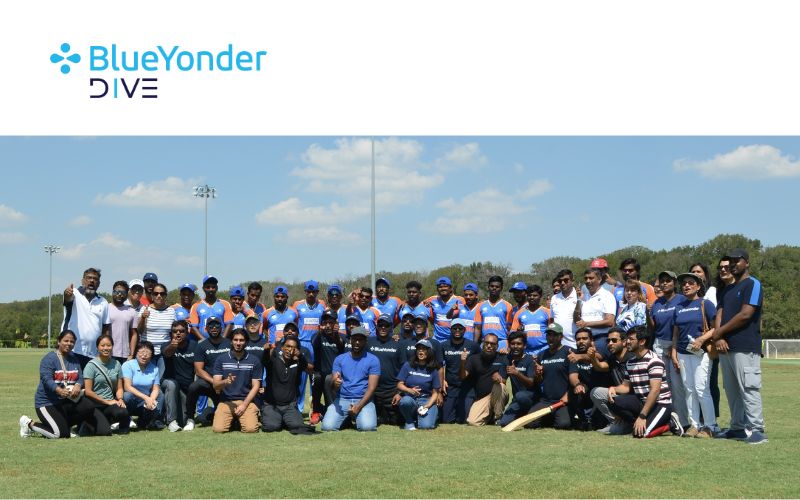Blue Yonder Dallas Associates Play Cricket To Raise Awareness About Visual Impairment
In this DIVE In blog post, Blue Yonder associate Ravi Sajja shares his recent experience helping to coordinate a cricket game in Dallas on behalf of Blue Yonder to bring awareness to visual impairment and promote inclusivity.
Cricket is a game of skill and technique. Now imagine playing this sport with a visual impairment. Well, it’s possible thanks to organizations like the Cricket Association for the Blind in India (CABI), which has been at the forefront of raising awareness about blind cricket worldwide.
To promote inclusivity, CABI and the Subu Kota Foundation put together a U.S. tour for the reigning World Champion Indian Men’s Cricket Team for the Blind across nine cities: Boston, Washington D.C., New York, Chicago, Detroit, Dallas, Los Angeles, Seattle, and San Francisco. The tour is supporting the Samarthanam Trust for the Disabled, a leading nonprofit organization in India working for people with disabilities. The goal of the tour is to increase awareness by playing local teams and raise funds for the nonprofit’s mission.
How does this involve Blue Yonder you might ask? Blue Yonder India has partnered with the Samarthanam Trust for the Disabled for over a decade, supporting its various initiatives, particularly those aimed at the blind and intellectually challenged. When the Blue Yonder India Corporate Social Responsibility team learned about the opportunity to host the Indian Men’s Cricket Team for the Blind in Dallas during the last week of August, the local team couldn’t say no!
The Dallas office quickly rallied to participate, securing a venue and date. After all, hosting a cricket match featuring Blue Yonder associates and the World Champions is a rare and exciting opportunity.
In India, cricket unites 1.4 billion people like no other sport. Some of the other countries where cricket is widely popular include England, Pakistan, Australia, South Africa, Bangladesh, Zimbabwe, Ireland, and the Netherlands. Cricket, in popularity, is second only to soccer worldwide. To illustrate, Dallas alone has approximately 200 cricket teams that actively compete in leagues throughout the city.
In preparation for the game, the Blue Yonder team familiarized themselves with blind cricket by watching instructional videos and participating in a practice session. Blind cricket differs from standard cricket in several ways. Amongst the most distinct differences are that the ball is lighter, made from different materials, and rattles to assist visually impaired players in locating it. Additionally, the ball is rolled by the bowler rather than pitched/bounced.
On match day, both teams rendezvoused at McKinnish Park in Carrollton, Texas. Arrangements were made to keep spectators comfortable in the hot Texas weather. Dhiraj Sequeira, Tournament Chairman of CABI, introduced the teams and explained the rules of blind cricket. There were three categories of players on the Indian team: B1 – players in this category are completely blind; B2 – players can see up to 2 meters; and B3 – players can see up to 6 meters. Their team comprised all three categories in an even distribution.
The event drew over 35 Blue Yonder associates, who came to cheer and observe the unique format of the game. During an opening ceremony, Dr. Mahantesh G.K., Chairman of CABI, expressed deep gratitude for Blue Yonder’s long-standing support and highlighted the positive impact of their partnership. The event included two segments: a demonstration by the Indian Men’s Cricket Team for the Blind and a competitive match featuring both teams.
In the competitive match, the Indian team scored 113 runs for the loss of one wicket, while the Blue Yonder team was all out for 61 runs. The Indian Men’s Cricket Team for the Blind were exceptional in all aspects of the game. Despite the loss, the Blue Yonder players were awestruck by their opponents’ remarkable skills.
During a closing ceremony, Nathalie Carruthers, Blue Yonder’s Chief Associate Success Officer, praised the partnership between both organizations. Dr. Mahantesh G.K. and Shailender Yadav, CABI’s General Secretary, presented Nathalie with a commemorative memento, including Dr. Mahantesh’s autobiography titled “Eye Opener,” and a cricket ball signed by the Indian team. Dr. Mahantesh described the match as more than just a game; he saw it as a powerful testament to inclusion, resilience, and community spirit. He thanked Blue Yonder for its role in promoting disability awareness and for the lasting impact on everyone involved.
It was an extraordinary opportunity to be a part of this remarkable event. The word “inspiration” barely captures the profound experience Blue Yonder associates had that day. That day, cricket triumphed. Resilience triumphed. And in a broader sense, we all triumphed.

